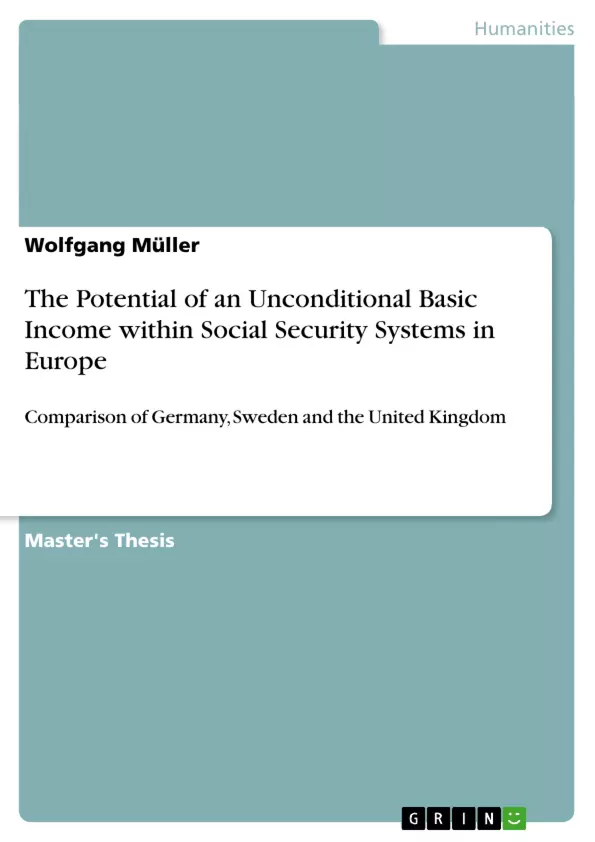The current social security systems in Europe have not been able to deal with increased traditional and new risks such as unemployment or work-life balance. One suggested solution to this problem has gained more popular and academic support in recent years: the idea of a universal, unconditional basic income (UBI). This study, therefore, examines whether and how UBI could support social security systems in the UK, Germany and Sweden in order to achieve their aims and fulfil their functions, and thus to improve insufficient social security.
Since effectiveness and efficiency describe the functionality of social security systems, the study focuses on these two aspects. These aspects will be used to theoretically discuss expected effects of UBI along with the main aims and functions of key policies in each country in regard to their effectiveness and efficiency.
In comparison with current social security schemes in each country, the study demonstrates that UBI is able to deal better with several traditional and new risks, despite problems with higher expectations and living standards. UBI provides basic needs and will especially pull risk away from people in need.
Additionally, it alleviates poverty and fosters social cohesion. These achievements help to improve the effectiveness and efficiency of the social security systems in the UK, Germany and Sweden.
Inhaltsverzeichnis (Table of Contents)
- INTRODUCTION
- OBJECTIVE
- OUTLINE
- METHOD AND SELECTION
- UNCONDITIONAL BASIC INCOME
- DEFINITION
- DESIRABILITY
- WELFARE TYPES
- WELFARE REGIMES
- MIXED ECONOMY OF WELFARE
- SOCIAL SECURITY
- AIMS, OBJECTIVES AND FUNCTIONS
- EFFECTIVENESS
- POVERTY ALLEVIATION
- INCOME REPLACEMENT
- COMPENSATION
- REDISTRIBUTION
- RISK PROTECTION
- SOCIAL COHESION
- BEHAVIOURAL CHANGE
- EFFICIENCY
- TARGET EFFICIENCY
- ECONOMIC EFFICIENCY
- ADMINISTRATIVE EFFICIENCY
- CONCLUSION
- EXECUTIVE SUMMARY
Zielsetzung und Themenschwerpunkte (Objectives and Key Themes)
This study aims to examine the potential of a universal, unconditional basic income (UBI) in supporting social security systems in the UK, Germany, and Sweden. The study focuses on the effectiveness and efficiency of social security systems and how UBI could contribute to improving their functionality. The key themes explored in this study include: * **Effectiveness of UBI:** How UBI can address traditional and new social risks, alleviate poverty, and foster social cohesion. * **Efficiency of UBI:** Analyzing the target, economic, and administrative efficiency of UBI compared to existing social security systems. * **Social Security Systems:** Examining the aims, objectives, and functions of social security policies in the UK, Germany, and Sweden. * **Comparison of Social Security Systems:** Assessing the effectiveness and efficiency of different welfare regimes in the three countries. * **Impact of UBI on Social Security Systems:** Evaluating how UBI could improve the overall performance of social security systems.Zusammenfassung der Kapitel (Chapter Summaries)
The study begins by introducing the objective and scope of the research, outlining its focus on UBI and social security systems in the UK, Germany, and Sweden. Chapter 2 details the research methodology and selection criteria for the study. Chapter 3 provides a definition and discussion of the desirability of UBI, exploring its potential benefits and challenges. Chapter 4 delves into different welfare types and regimes, particularly the mixed economy of welfare, which is relevant to the three countries analyzed. Chapter 5 focuses on the social security systems in each country, outlining their aims, objectives, and functions. The study then moves on to examine the effectiveness of UBI in terms of poverty alleviation, income replacement, compensation, redistribution, risk protection, social cohesion, and behavioral change in Chapter 6. Chapter 7 explores the efficiency of UBI, analyzing target, economic, and administrative efficiency.Schlüsselwörter (Keywords)
The primary keywords and focus topics of the text are: basic income, welfare, social security, social risk, poverty, social cohesion, effectiveness, efficiency, Germany, Sweden, United Kingdom. The study focuses on analyzing the potential benefits and challenges of implementing UBI within the context of existing social security systems in these three European countries.Frequently Asked Questions
What is an Unconditional Basic Income (UBI)?
UBI is a universal payment made to all individuals without a means test or work requirement, intended to provide for basic needs and foster social cohesion.
Which countries are compared in this study on UBI?
The study examines the potential impact of UBI on the social security systems of the United Kingdom, Germany, and Sweden.
How can UBI improve social security efficiency?
UBI can improve administrative efficiency by simplifying the welfare system and target efficiency by ensuring that everyone in need receives basic risk protection.
Can UBI effectively alleviate poverty?
Yes, the study demonstrates that UBI is better equipped to handle traditional and new social risks, providing a safety net that pulls people out of poverty.
What are "new social risks" mentioned in the study?
New social risks include challenges like work-life balance issues and modern forms of unemployment that current welfare regimes struggle to address effectively.
- Quote paper
- Wolfgang Müller (Author), 2012, The Potential of an Unconditional Basic Income within Social Security Systems in Europe, Munich, GRIN Verlag, https://www.grin.com/document/204633



